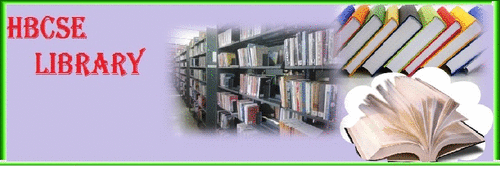January 2014
January 2014
1. 001.4 2613
Adedokun, Omolola A. (2013). Research skills and stem undergraduate research students' aspirations for research careers : mediating effects of research self efficacy. Journal of Research in Science Teaching, 50 (8), 940 – 951.
2. 001.4 2638
Pyke, Graham H. (2013). Struggling scientists: please cite our papers! Current Science, 105 (8), 1061 – 1066.
3. 001.4 2639
Prathap, Gangan (2013). Benchmarking research performance of the IITs using Web of Science and SCOPUS bibliometirc databases. Current Science, 105 (8), 1134 –1138.
4. 363.7099 2641
Vikiran mithak evam vastavikata: Special Section (Hindi) (2013). Aavishkar, 43 (7).
5. 370 2609
Aoupacharik prathamik shikshan : ek upaukta prayog: Speical Issue. Shikshan Ani Samaj, 36 (1).
6. 370 2611
Mahajan, Mukund (2012). Gurudev Tagoranche shikshanvichar. Shikshan Ani Samaj, 35 (4), 30 – 38.
7. 370 2640
Ruiz-Gallardo, Jose-Reyes (2013). Gender based learning: an experience with "at risk" secondary education students. Journal of Environmental Education, 44(4),252-270.
8. 372 2637
Samaveshak shikshan : Speical Issue (2013). Shikshanvedh, 4 (5).
9. 372 2642
Maulick, Barna Ganguli (2013). Gender disparity in primary and upper primary levels: a concern for Bihar. Man & Development, 35 (3), 95 – 108.
10.507 2607
Kawalkar, Aisha (2013). Scaffolding science talk: the role of teachers' questions in the inquiry classroom. International Journal of Science Education, 35(12),2004 -2027.
11.507 2612
Matthews, Michael R. (Ed) (2013). Commercialisation and commodification of science: educational responses : Special Issue. Science & Education, 22 (10).
12. 507 2614
Vedder-Weiss, Dana (2013). School, teacher, peers, and parents' goals emphases and adolescents' motivation to learn science in and out of school.Journal of Research in Science Teaching, 50 (8), 952 – 988.
13. 507 2615
Zangori, Laura (2013). Fostering student sense making in elementary science learning environments : elementary teachers' use of science curriculum materials to promote explanations construction. Journal of Research in Science Teaching, 50 (8), 989 – 1017.
14. 507 2616
Morin, Olivier (2013). Digital technology to support students' socio-scientific reasoning about environmental issues. Journal of Biological Education, 47 (3), 157 – 165.
15. 507 2617
Olander, Clas (2013). Why am I learning evolution? pointers towards enacted scientific literacy. Journal of Biological Education, 47 (3), 175 – 181.
16. 507 2618
Nowak, Kathrin Helena (2013). Assessing students' abilities in processes of scientific inquiry in biology using a paper and pencil test. Journal of Biological Education, 47 (3), 182 – 188.
17. 507 2619
Sampson, Victor (2013). Writing to learn by learning write during the school science laboratory : helping middle and high school students develop argumentative writing skills as they learn core ideas. Science Education , 97 (5), 643 – 670.
18. 507 2620
Kind, Per Morten (2013). Conceptualizing the science curriculum: 40 years of developing assessment frameworks in three large scale assessments. Science Education, 97 (5), 671 – 694.
19. 507 2621
Heddy, Benjamin C. (2013). Transforming misconceptions: using transformative experience to promote positive affect and conceptual change in students learning about biological evolution. Science Education, 97 (5), 723 – 744.
20. 507 2622
Heywood, David (2013). Exploring the visuo-spatial challenge of learning about day and night and the sun's path. Science Education, 97 (5), 772 – 796.
21. 507 2623
Wei, Bing (2013). Representations of nature of science in selected histories of science in the integrated science textbooks in China. School Science & Mathematics, 113 (4), 170 – 179.
22. 507 2624
Forbes, Cory T. (2013). Investing essential characteristics of scientific practices in elementary science learning environments : the Practice of Science Observation Protocol (P-SOP). School Science & Mathematics, 113 (4), 180 – 190.
23. 507 2625
Cotabish, Alicia (2013). Effects of a STEM intervention on elementary students' science knowledge and skills. School Science & Mathematics, 113 (5), 215 – 226.
24. 507 2626
Sampson, Victor (2013). Development and intial validation of the Beliefs About Reformed Science Teaching and Learning (BARSTL) Questionnaire. School Science & Mathematics, 113 (1), 3 – 15.
25. 507 2627
Judson, Eugene (2013). Development of an instrument to assess and deliberate on the integration of mathematics into student centered science learning. School Science & Mathematics, 113 (2), 56 – 68.
26. 507 2628
Ali, Mohamed M. (2013). Changes in student attitudes regarding science when taught by teachers without experiences with a model professional development programme. School Science & Mathematics, 113 (3), 109 – 119.
27. 507 2629
Sonnert, Gerhard (2013). Gender aspects of participation, support, and success in a state science fair. School Science & Mathematics, 113 (3), 135 – 143.
28. 507 2630
Lee, Yew-Jin (2013). Value of fidelity of implementation criteria to evaluate school based science curriculum innovations. International Journal of Science Education, 35 (15), 2508 – 2537.
29. 507 2631
Ferreira, Silvia (2013). Nature of science in science curricula: methods and concepts of analysis. International Journal of Science Education, 35 (16), 2670 – 2691.
30. 507 2632
Spektor-Levy, Ornit (2013). Science and scientific curiosity in pre-school: the teacher's point of view. International Journal of Science Education, 35 (13), 2226 – 2253.
31. 507 2633
Hamza, Karim M. (2013). Student engagement with artifacts and scientific ideas in a laboratory and a concept mapping activity. International Journal of Science Education, 35 (15), 2254 – 2277.
32. 507 2634
Korpershoek, Hanke (2013). Students' preconceptions and perceptions of science Oriented studies. International Journal of Science Education,35 (14), 2356–2375.
33. 507 2635
Yung, Benny (2013). Teachers' and students' conceptions of good science teaching. International Journal of Science Education, 35 (14), 2435 – 2461.
34. 507 2636
Jones, M. Gail (2013). Teachers' concepts of spatial scale: an international comparison. International Journal of Science Education, 35 (14), 2462 – 2482.
35. 510.7 2608
Crane, Corinna C. (2013). Girls' and boys' mathematics achievement, affect, and experiences : findings from ECLS – K. Journal for Research in Mathematics Education, 44 (4), 634 – 645.
36. 510.7 2610
Pitsolantis, Nicole (2013). Fractions instruction: linking concepts and procedures. Teaching Children Mathematics, 20 (1), 18 – 26.

